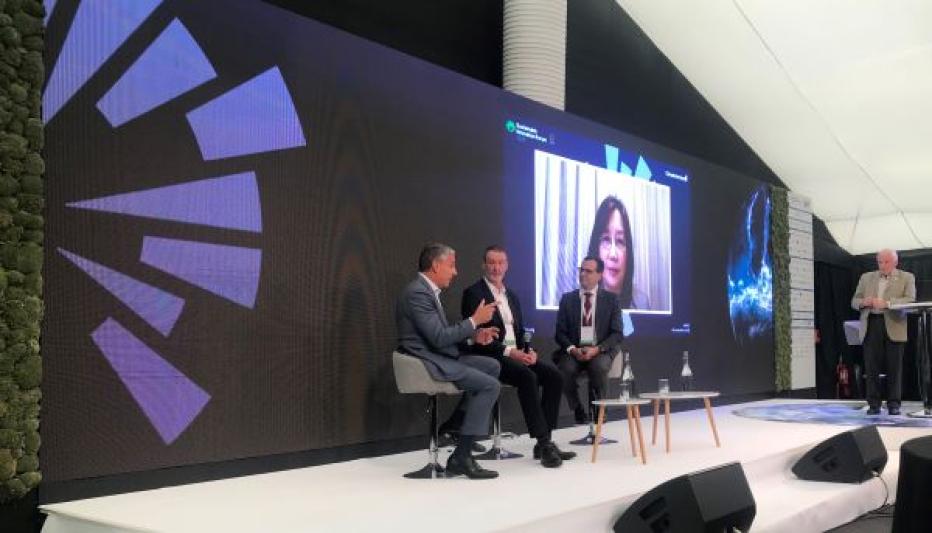
As I reflect on the 26th UN Climate Change Conference of the Parties (COP26), I was really pleased not only to see so many government leaders come together to discuss climate action seriously, but also the wide representation from across civil society organizations and the private sector, particularly the emerging innovators.
While COP26 made encouraging and important progress, with agreements to cut methane, halt deforestation and commit over $130 trillion of private capital to transform the global economy to net zero, it has not shifted the world decisively on to a path to the 1.5ºC goal. It does provide strong intent – which must now be supported by clearly committed action and deliverables to meet these long-term goals and ambitions.
The technologies and solutions exist, but the biggest challenge facing the world is coordinated leadership that is open minded to change, with a sense of urgency and accountability to truly make things happen.

Why did I attend COP26?
It is our mission at Jacobs to drive and accelerate sustainable, connected solutions. So, attending COP26 provided the opportunity to actively collaborate, learn from other businesses and the public sector, and share best practices and solutions about what we are doing to mitigate and adapt to the climate crisis with our clients, our partners, across industry and in our own operations. Businesses need to be a core part of any plan to accelerate the transition to a net zero future and I believe we at Jacobs have a pivotal role to play in that.
Discussions throughout the week provided for the opportunity to meet some new, interesting companies and ventures with sustainable, innovative ideas, as well as deepen relationships with familiar industry partners and clients.
Our Jacobs’ specialists, as well as our colleagues from PA Consulting, joined panel discussions at the Climate Action Sustainable Innovation Forum and the World Climate Summit’s The Investment COP to share insights on what we are doing and where we see the priorities ahead.
I joined Climate Action’sTransforming Infrastructure to Achieve Our Climate Ambitions panel, alongside industry colleagues including Singapore Green Building Council Executive Director Yvonne Soh, EDF CEO Simone Rossi, and Mott MacDonald CEO Mike Haigh, to discuss the challenges of transforming infrastructure and what is needed to ensure a carbon neutral pathway for the global built environment. And I also spoke to Climate Action about what we at Jacobs are doing to tackle global climate-related challenges.
If we look at cities, while being a fundamental component of a modern society, they are also major contributors to climate change, responsible for generating 60% of greenhouse gas emissions globally. Transformational change is needed to accelerate their transition to net zero and deliver co-benefits that address other challenges, and this requires multiple stakeholders to collaborate and agree on systemwide solutions rather than taking siloed approaches.
At Jacobs, we have worked on some incredibly complex programs, where success is largely underpinned by the ability to inspire and manage multifaceted stakeholder groups to come together and deliver multiple projects that support progress towards a shared vision or goal. By applying a programmatic approach, we can develop solutions that reduce carbon, deliver synergies between assets, projects and stakeholders, and address the needs of the community. Success also requires engagement of strong, coordinated leadership, who inspire the right delivery culture and behavior across the teams, with a well-defined vision of how to deliver transformational outcomes.
What is Jacobs doing to help tackle climate change?
At Jacobs, we’re fully committed to the 1.5ºC scenario, both in how we operate our business and in the climate action, decarbonization and sustainability solutions we implement in partnership with our clients. In fact, we became carbon neutral for our operations and business travel in 2020, with a plan in place to get to carbon negative by 2030.
Since our baseline of 2019 we have reduced our total emissions scope 1 and 2 and business travel by almost 50%. While the pandemic contributed to us meeting this target early through the suspension of business travel (our largest single source), we didn’t stop there. Our New Ways of Working initiative consolidated and reduced our total office space, we moved to 100% renewable electricity for our offices, we are greening our fleet, and we are introducing an internal price for carbon for our business travel to influence greener behaviors. And in August, we were also one of over 80 companies taking part in the road test of the world's first NetZero Standard, launched by The Science Based Targets initiative.
Looking forward, our biggest area of influence to help address climate change is across our client portfolio. We exited the oil and gas sector in 2019, and our strategic growth investments since have been focused on further strengthening our high value, sustainable solutions strategy. We are committed to further enhancing our position as a global ESG solutions leader. One of our sustainability targets is that 100% of Jacobs’ solutions will contribute to progress against the UN Sustainable Development Goals by 2025.
There are many different views on the success of COP26. For me, the real success comes down to purposeful actions that each one of us takes that enable all generations to believe in the reality of a resilient future where we thrive in harmony with our planet.
Steve Demetriou,
Jacobs Chair & CEO














































